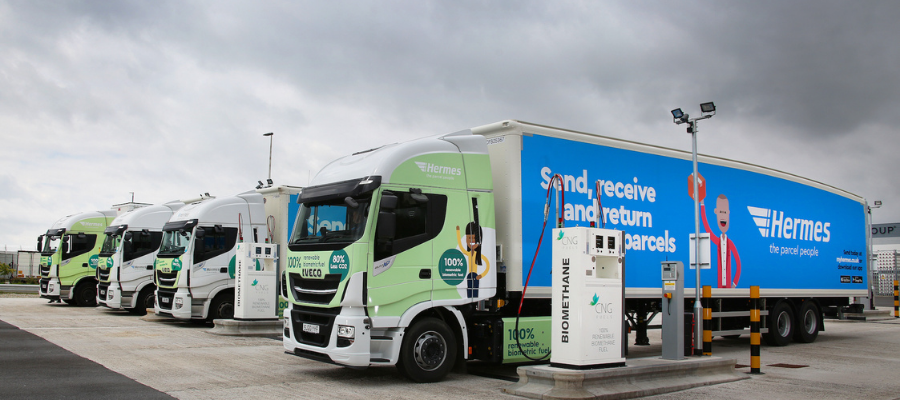🕒 Article read time: 2 minutes
The role of low carbon fuels for HGVs

The logistics industry is firmly committed to achieving net zero and many of Logistics UK’s members are already making investments and operational decisions to support the reduction of greenhouse gas (GHG) emissions.
However, with the deadline to achieve net zero by 2050 looming large on the horizon, key questions about the best way to achieve this remain. In early 2022, the government launched its Low carbon fuel strategy: call for ideas, and while we are awaiting the outcome of this, Logistics UK’s response is outlined below.
BATTERY ELECTRIC WIDELY ADOPTED FOR VANS
For those operating light commercial vehicles, such as vans, battery electric has been widely adopted as the alternative to petrol and diesel. For some larger vans, there may still be a use for low carbon fuels or hydrogen, but, overall, Logistics UK members see the greatest potential for low carbon fuels in road transport to be for heavy goods vehicles (HGVs).
ZERO EMISSION – A SIGNIFICANT CHALLENGE FOR HGVS
As has been well documented, larger HGVs are particularly challenging to decarbonise and there is not yet a commercially viable technology solution that is zero emission at the tailpipe. For smaller HGVs, battery electric vehicles could be adopted more rapidly to accommodate demand, but this is dependent on vehicles coming to market that are affordable for operators to acquire and run, as well as having sufficient appropriate and supportive infrastructure in place.
LOW CARBON FUELS OFFER A BRIDGE TO ZERO EMISSIONS
Operators are currently awaiting the outcome of the Zero Emission Road Freight Trials to see which technology – or mix of technologies – offer the most commercially viable solutions for heavier HGVs, as well as how and when the infrastructure to support the vehicles will be developed and implemented nationwide. Despite this ongoing uncertainty, and the time pressures involved, operators remain keen to utilise and adopt low carbon fuels that can lower emissions from both new vehicles, and those already in the existing fleet.
There are already many examples of Logistics UK members adopting low carbon fuels, such as hydrotreated vegetable oil (HVO) and biomethane. These have been demonstrated to offer excellent GHG emission savings and, in the case of ‘drop-in’ fuel HVO, this can be easily used in current vehicle fleets without significant modifications.
SIGNIFICANTLY FEWER EMISSIONS
A report by Zemo Partnership entitled ‘Market opportunities to decarbonise heavy duty vehicles using high blend renewable fuels’ concluded that the greatest opportunity for deploying high blend renewable fuels was in HGV fleets using back-to-base ‘depot’ refuelling. The study noted that the complete replacement of fossil fuels with Renewable Transport Fuel Obligation (RTFO) approved renewable fuels such as biodiesel, HVO and biomethane can achieve more than 80% GHG emissions savings. It also determined significant savings could be achieved over the next decade, with the HGV fleet adopting a 30% renewable fuel blend taking into account diesel and gas HGVs.
These findings highlight the GHG emissions savings that would be lost if low carbon fuels are not more widely adopted for use in HGVs. To encourage their uptake, however, the uncertainty around their use must first be addressed.
Michelle Gardner, Head of Public Policy, Logistics UK, said: “Logistics UK views low carbon fuel alternatives as a short to medium term solution; they will play a crucial role while alternative technologies are sought, and will continue to be of use while HGVs are transitioning to newer technologies as part of the natural fleet replacement cycle once they are readily available.
“A nationally applied low carbon fuels strategy is vital to give logistics operators the confidence to integrate these alternatives into their vehicle fleets. However, this is not without cost and Logistics UK is therefore calling on government to provide financial support to enable more operators to adopt these fuels and reach lower emission targets, faster.”
*www.logistics.org.uk/environment
Published On: 16/06/2022 16:00:09

Comments Section
If you are a Logistics UK member login to add comments.